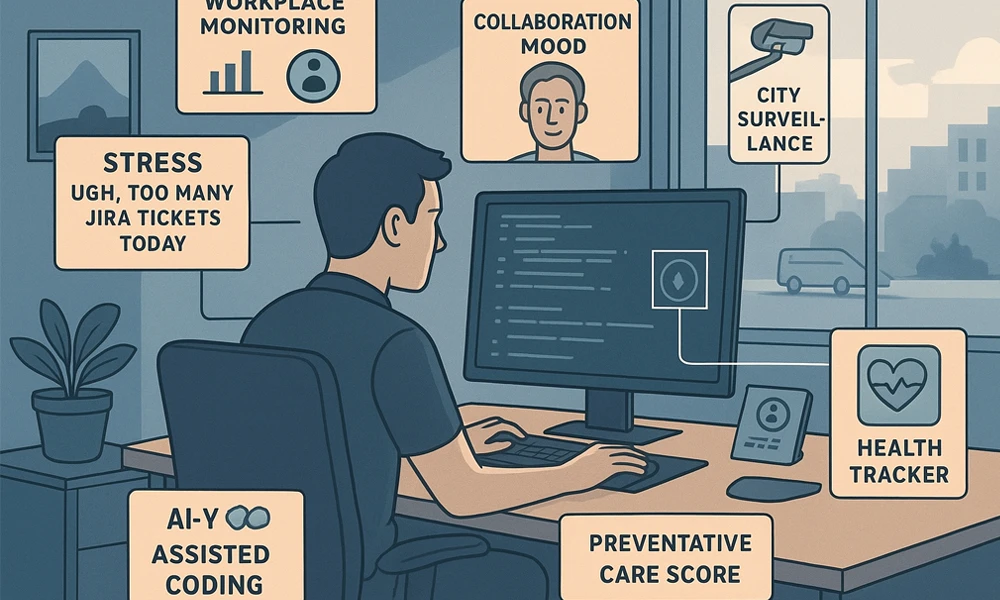Welcome to 2050. Being a web developer isn’t just about writing code anymore, it’s about living inside a system where every click, thought, and heartbeat is logged, analyzed, and scored. Privacy isn’t gone with a bang, it’s slipped away with convenience. Here’s what an ordinary day looks like.
7:00 AM – Your coffee machine already knows you’re awake because your biometrics say your REM cycle ended. It brewed your “recommended” coffee blend before you even asked. That choice goes straight into a central nutrition database, your employer gets a weekly health summary to adjust your productivity forecast.
8:30 AM – You log in to work. There’s no “passwords” anymore, your iris, voice, and typing cadence auto-verify you. You mutter, “ugh, too many Jira tickets today” under your breath. Joke’s on you: your AI work assistant parsed that as a stress indicator and flagged it for your manager’s dashboard.
10:00 AM – You’re on a client call. The meeting AI not only transcribes everything, it also scores your tone, attention, and “collaboration mood.” You didn’t realize your slightly sarcastic comment about “scope creep” got logged as a negative sentiment marker in the client relationship database.
12:00 PM – Lunch break. You walk out, and city-wide cameras track your gait, syncing with your health insurance. You order a burger instead of the AI-recommended salad. That goes straight to your “preventative care score.” Insurance premiums tick up by 0.2%.
2:00 PM – You push code. The IDE has mandatory compliance hooks. It doesn’t just lint your syntax, it checks if your comments match company-approved “inclusive tone” standards. Accidentally type “master branch” out of habit? Flagged, corrected, logged.
6:00 PM – You head home in an autonomous pod. The ad screen knows you bought a VR headset last week, so it serves you “productivity boosters” (a nootropic subscription). The system also quietly logs your commute chats with a friend, and machine learning detected “job dissatisfaction” keywords. That info feeds back into your company’s talent retention risk score.
11:00 PM – You put your AR glasses on the nightstand. They sync your daily “engagement” stats, how often you smiled in meetings, how many hours of “deep focus” you had, how much eye contact you made. It auto-generates tomorrow’s “optimization recommendations.” You fall asleep… not really keeping any secrets, because even your dreams are flagged by your neural health tracker as “stress-anomalous.”
The Secret Rule
Now → 2035: We’re in the “creep” stage. Secrets are fragile but not gone. Corporations and governments already know way more than you think, but there’s still plausible deniability... people can hide in the noise. Privacy tools (VPNs, encryption, ad blockers) are still somewhat effective, but the average person doesn’t really bother.
2035 → 2050: Expect the “practical no-secrets” era. AI cross-referencing + omnipresent sensors means that if someone wants to know something about you, it’s basically guaranteed they can. The illusion of privacy may still exist (laws, opt-outs), but in practice? Secrets evaporate once you touch a device, network, or camera.
2050 → beyond: If trends hold, this is the “cultural acceptance” era. People will live with the assumption that nothing is private. The weird shift will not be that secrets are impossible, but that nobody cares if you don’t have any.
So, in short:
You probably won’t see an absolute no-secrets society in your lifetime. But you will live through the practical no-secrets era. Based on trends, likely around the mid-21st century.
No Secrets Allowed
- Biometrics replacing passwords? Already happening (Face ID, fingerprint logins, typing cadence recognition is in research).
- Health data leaking to employers/insurers? Wearables like Apple Watch, Fitbit, and Oura rings already share “wellness data.” Insurance companies are testing discounts/penalties based on it.
- Sentiment analysis in the workplace? Microsoft Teams, Zoom, and Slack already push “mood AI” features. In 2050, it’ll be way less clunky.
- Surveillance cities? China is already there with gait recognition and social credit pilots. Western societies resist hard social scoring, but softer versions (credit scoring, loyalty programs, “trust” ratings) are creeping in.
- AI policing your code/comments? Companies are already rolling out “AI governance” tools that review code for compliance, inclusivity, and IP risks. Multiply that by 25 years of regulation creep.
- Advertising based on private convos? It’s not a conspiracy, phones listen for keywords locally now, and recommendation models adapt frighteningly well.
